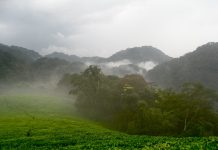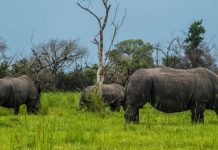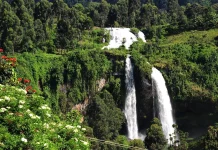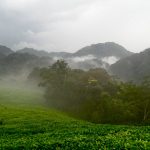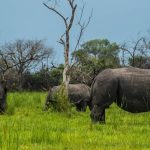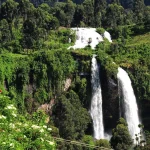The Pearl of Africa Tourism Expo (POATE) was launched by Uganda Tourism Board (UTB) in 2017. Over the years, POATE has become a major travel trade show in East Africa for business to business (B2B) and business to consumer (B2C). The 8th edition of POATE is scheduled to start on 23rd and end on 25th May at the Speke Resort and Convention Centre Munyonyo in Kampala.
The state-of-the-art facility has 200 meeting rooms, 20 boardrooms, 447 accommodation rooms, and 6 outdoor venues. Given its unique location on shores of Lake Victoria, the venue has a tranquil environment for meetings, incentives, conferences, and events (MICE). The event is organised by UTB in partnership with the Ministry of Tourism Wildlife and Antiquities (MTWA), the private sector among other local stakeholders.
Opportunities for trade visitors, local, and international exhibitors intending to take part in the event are available for booking through UTB head offices in Kampala. Over 70 travel business professionals (hosted buyers) and 5,000 trade visitors are invited to attend. POATE offers an opportunity to network and showcase your travel, tourism and hospitality products and services to a potential business partner or client in a safe face-to-face environment.
“Responsible Tourism” is the theme for this year’s Expo and the intention is to create awareness among the various stakeholders about the meaning of the topic. As one of the biggest industries in the global economy, international tourism was projected to reach 90% of pre-Covid-19 pandemic levels by 2024. According to UN Tourism, $1.4 trillion was generated in 2023 which is almost 93% of the $1.5 trillion earned in 2019.
Tourism in Uganda is a fundamental pillar driving economic growth. According to the MTWA Annual Tourism Performance Report FY 2023, tourist arrivals have recovered by 56% after the pandemic from 814,508 in 2022 to 1,272,210 in 2023. The sector generated over $1 billion compared to $ 1.453 billion as foreign exchange in 2017-2018.
As tourism is growing rapidly, it is also causing negative impacts including habitat loss, environmental degradation, deterioration of authenticity among local cultures. Responsible tourism is a branch of tourism that attempts to minimize the negative impact by doing the right stuff. The best way to put responsible tourism into practice requires careful planning and management of tourism by all stakeholders at all levels.
There are several ways that people and organizations in the tourism sector can exhibit responsible behavior. For instance, preserving the natural environment and culture and heritage, hiring local staff, involving local communities in decision making, use of ethical marketing and promotion, corporate social responsibility, and use of eco-friendly products. As such, POATE is offering an opportunity to learn how tourism can promote the sustainable development goals.
Examples of responsible tourism in Uganda include environmental clean-up campaigns that are done by several organisations including the Miss Tourism Uganda and the Uganda Lodges.
Some of the local communities around several national parks are also benefiting from direct involvement with lodges. For instance, the Clouds Mountain Gorilla Lodge in Nkuringo sector in southern Bwindi is actually owned by the community and managed by private lease holders.
Given the high-end nature of the lodge, the resources transferred to the community are very significant, in addition to the staff, food and furnishings which can be sourced locally. Many other lodges also generate modest benefits for the surrounding communities including Nkuringo Bwindi Gorilla Lodge. This is a carbon neutral lodge that works with the Uganda Carbon Bureau to offset its carbon footprint through several projects which include indigenous tree planting, rain water harvesting, pack for a purpose and fair trade policy.
There’s also Uganda Wildlife Authority’s experiential tourism activities that you can do on safari such as lion tracking in Queen Elizabeth national park. These few examples show how Uganda is adapting to the travel trend where there’s a shift from traditional safaris of sun, sea and sand towards the experiential travel which aligns with the sustainable development agenda.
Uganda offers a wide range of tourist attractions of which the most notable are the mountain gorillas in Bwindi and Mgahinga gorilla national parks. These rare endangered primates can only be found in Uganda, Rwanda and DR Congo. Primates give Uganda a competitive advantage through gorilla trekking tours over the game viewing safaris which are dominated by Kenya, Tanzania and South Africa.
In addition to the primates, Uganda also offers 10 national parks, 13 wildlife reserves, and an impressive variety of bird species estimated at over 1073 species, the source of the Nile at Jinja with adventure tourism, whitewater rafting, and bungee jumping. The spectacular Rwenzori Mountains offer multiple-day trekking, beautiful lakes, rich cultural and historical heritage and night life round out the picture. Thus, Uganda offers tours of one or two weeks which combine primate trekking, mountain climbing, adventure, and game viewing.

